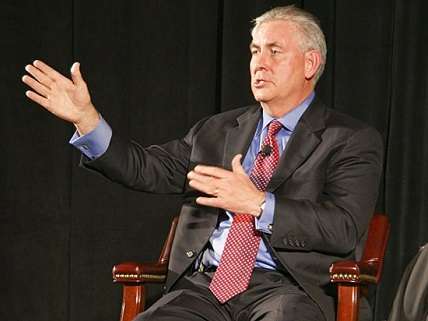Concern Over Tillerson Skipping NATO Meeting Misplaced
The secretary of state is staying in the U.S. to be at President Trump's meeting with China President Xi Jinping.

Secretary of State Rex Tillerson will miss a summit of NATO foreign ministers in Brussels on April 5 and 6 in order to be present at the meeting between President Trump and China President Xi Jinping at Mar-a-Lago on April 6 and 7. Reuters yesterday initially reported based on anonymous sources that the State Department had declined offers to try to reschedule the NATO meeting, but today, Reuters reports, Tillerson offered alternative dates he could attend. "We are certainly appreciative of the effort to accommodate Secretary Tillerson," a spokesperson for the department said at a press conference.
Rep. Elliot Engel (D-N.Y.) called Tillerson skipping the meeting, in favor of a meeting between the presidents of two of the most powerful countries of the world, "a grave error that will shake the confidence of America's most important alliance and feed the concern that this administration is simply too cozy with Vladimir Putin." Tillerson has a planned visit to Russia later this month. Hysteria over Russia's purported role in Hillary Clinton's presidential defeat always risked poisoning already complex and deteriorated relations between the U.S. and Russia. Spinning scheduling conflicts and routine foreign trips for a secretary of state as part of some imagined Trump-Putin connection is particularly irresponsible for anyone who says they support international engagement over unnecessary conflict.
Neither should European politicians and bureaucrats seek to do so. One anonymous senior European diplomat told Reuters that Tillerson meeting the meeting was "unfortunate symbolism," as Reuters reported after the State Department signaled it was interested in a rescheduling of the NATO meeting.
In its earlier article, Reuters reported that "Trump has already worried NATO allies by referring to the Western security alliance as 'obsolete' and by pressing other members to meet their commitments to spend at least 2 percent of gross domestic product on defense." Yet for American and European politicians, bureaucrats, and policymakers interested in maintaining the NATO alliance, neither of these points should be a cause for concern. The Trump administration has insisted campaign period comments about NATO were not indicative of a U.S. withdrawal but interest in change. Asking other member states to meet a commitment they made, irrespective of how arbitrary it may be, is even less of a reason for concern.
Other than the U.S., only three NATO countries spend at least 2 percent of their GDP on defense spending—Greece, Poland, and Estonia. The latter two border Russia and have extensive histories that sustain the political will for military spending, while the former borders fellow NATO ally but historical rival Turkey, which has also in recent weeks compared a number of other European NATO allies to Nazis, and most recently accused the Netherlands of being responsible for the Srebrenica massacre. Erdogan's outburst come after the European countries declined to permit rallies in favor of a constitutional referendum that would significantly expand the power of Turkey's president, the authoritarian Recep Erdogan, who has been in power for 14 years.
Former Secretary of State John Kerry was criticized last year for leaving a NATO summit in Warsaw early to return to the U.S. to attend a friend's wedding in Nantucket and then to go see Hamilton in New York City, his second time attending the musical.
Editor's Note: As of February 29, 2024, commenting privileges on reason.com posts are limited to Reason Plus subscribers. Past commenters are grandfathered in for a temporary period. Subscribe here to preserve your ability to comment. Your Reason Plus subscription also gives you an ad-free version of reason.com, along with full access to the digital edition and archives of Reason magazine. We request that comments be civil and on-topic. We do not moderate or assume any responsibility for comments, which are owned by the readers who post them. Comments do not represent the views of reason.com or Reason Foundation. We reserve the right to delete any comment and ban commenters for any reason at any time. Comments may only be edited within 5 minutes of posting. Report abuses.
Please to post comments


Tillerson won't be attending any meetings until NATO's check clears.
Spinning scheduling conflicts and routine foreign trips for a secretary of state as part of some imagined Trump-Putin connection is particularly irresponsible for anyone who says they support international engagement over unnecessary conflict.
tough to imagine why fewer people want to identify with either team.
Shouldn't he be at the European table, eating what's being served without complaint?
And picking up the check, too.
Nice.
Situs Judi Bola Online | Capsa Susun
Agen Domino | Agen Poker | Agen Sakong | Agen BandarQ | Agen Domino Online
agen poker | agen domino | domino online | agen qq | qq online | bandarq